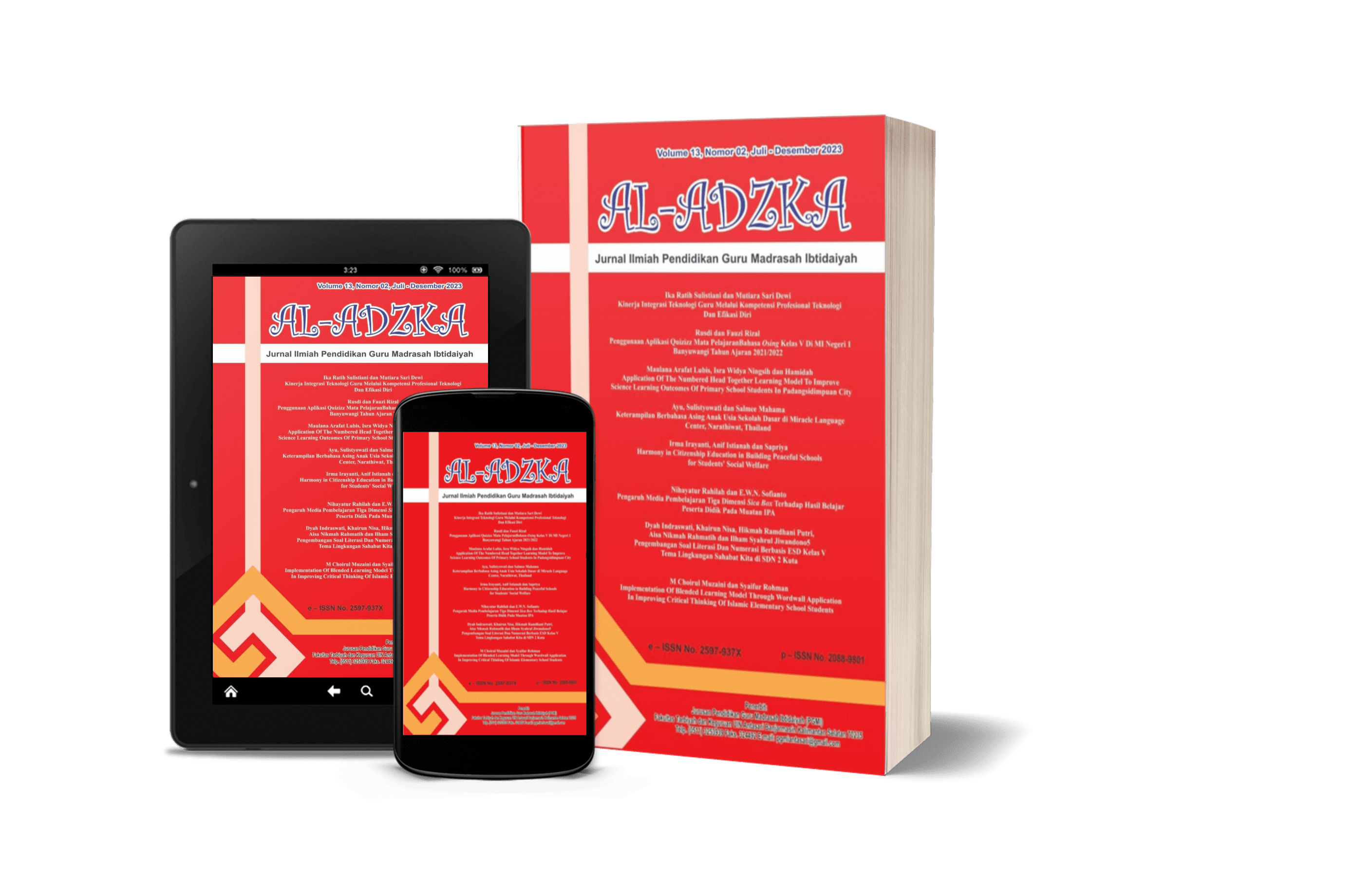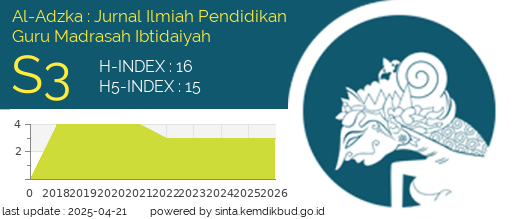Competence of Shadow Teacher in Building Confidence and Life Skills of Students with Special Needs
DOI:
https://doi.org/10.18592/aladzkapgmi.v15i1.15827Keywords:
Confident; Life Skills; Shadow Teacher; Teacher Competence; Elementary Education.Abstract
This study aims to describe the competencies of shadow teachers in developing the confidence and life skills of children with special needs at elementary school. The research method used is a qualitative descriptive research method with a phenomenological type. Data is collected through observation, interviews, and documentation. The study results show that shadow teachers have four competencies in building confidence and life skills. 1) Professional competence. Teachers improve professional competence by participating in training related to inclusion education online and offline; 2) Pedagogical competence. Teachers make individual learning programs based on the results of assessments carried out by psychologists, learning using a pullout system, children with special needs do the same learning as regular children, teachers always include children with special needs in school activities, three and social competence. Teachers include social relations with parents, social relations with experts (pediatricians and psychologists), social relations with children with special needs, social relations with regular children, and social relations between teachers; 4 and personal competence. The personal competencies of shadow teachers include being a special assistant teacher as a calling, patient and diligent, sincere, empathetic, fair, a spirit of learning, and having a high sense of affectionReferences
Alshaikhi, T., & Khasawneh, M. A. S. (2024). Enhancing Teacher Competence in Differentiated Instruction for English Language Learners with Disabilities: A Professional Development Intervention. World Journal of English Language, 15(1), 101. https://doi.org/10.5430/wjel.v15n1p101
Andrean, S., & Muqowim, M. (2020). Upaya Guru dalam Membiasakan Karakter melalui Pembelajaran Aqidah Akhlak di MI Ma’arif. Al-Adzka: Jurnal Ilmiah Pendidikan Guru Madrasah Ibtidaiyah, 10(1), 43. https://doi.org/10.18592/aladzkapgmi.v10i1.3634
Anggriana, T. M., & Trisnani, R. P. (2016). Kompetensi Guru Pendamping Siswa ABK di Sekolah Dasar. Jurnal Konseling Gusjigang, 2(2), 157–164. https://doi.org/10.24176/jkg.v2i2.702
Ansari, M. I., Barsihanor, B., & Nirmala, N. (2021). Peran Guru Pendamping Khusus Dalam Mengembangkan Emosional Anak Autisme di Kelas 1 A SDIT Al-Firdaus Banjarmasin. Al-Madrasah: Jurnal Pendidikan Madrasah Ibtidaiyah, 6(1), 21. https://doi.org/10.35931/am.v6i1.418
Aristya, F. S., & Rini, R. (2024). The Role of Shadow Teacher in Inclusive School : A Literature Review. International Journal of Current Science Research and Review, 07(01), 602–608. https://doi.org/10.47191/ijcsrr/V7-i1-58
BM, S. A., & Sakina, U. (2021). Upaya Pengembangan Kecakapan Hidup (Life Skill) Terhadap Anak Tunagrahita Di Sekolah Luar Biasa Negeri 1 Kabupaten Wajo. Jurnal Sipakalebbi, 4(2), 381–397. https://doi.org/10.24252/jsipakallebbi.v4i2.18547
Fajra, M., Jalinus, N., Jama, J., & Dakhi, O. (2020). Pengembangan Model Kurikulum Sekolah Inklusi Berdasarkan Kebutuhan Perseorangan Anak Didik. Jurnal Pendidikan, 21(1), 51–63. https://doi.org/10.33830/jp.v21i1.746.2020
Fatih, personal interview, July 4, 2024
Ferri, A. D., Buka, M., & Vampa, M. (2023). The Challenges of Inclusive Teaching in Albania and Its Issues in the Pre-School Curriculum. Journal of Educational and Social Reserach, 13(6), 307–316. https://doi.org/10.36941/jesr-2023-0166
Fithriyana, R. (2019). Hubungan kejadian acne vulgaris dengan kepercayaan diri pada siswi kelas XI di SMAN 2 Bangkinang Kota. Ners, 3(1), 7–12. https://doi.org/10.31004/jn.v3i1.394
Friend, M. (2018). Special Education: Contemporary Perspectives for School Professionals. Pearson.
Garzón Díaz, K. D. R., & Goodley, D. (2021). Teaching Disability: Strategies for the Reconstitution of Disability Knowledge. International Journal of Inclusive Education, 25(14), 1577–1596. https://doi.org/10.1080/13603116.2019.1640292
Halidjah, S., & Asrori, H. M. (2025). Tantangan dan Peluang dalam Implementasi Pendidikan Inklusif di SDN 24 Kecamatan Pontianak Kota. JUrnal Kajian Pembelajaran Dan Keilmuan, 9(1), 8–15. https://doi.org/10.26418/jurnalkpk.v9i1.88750
Herman, D., & Ramdhani, M. R. (2022). Meningkatkan Kemandirian Anak Berkebutuhan Khusus Melalui Program Home Visit. Educivilia: Jurnal Pengabdian Pada Masyarakat, 3(1), 67–72. https://doi.org/10.30997/ejpm.v3i1.5289
Hnoievska, O., Omelchenko, I., Kobylchenko, V., Klyap, M., & Shkvyr, O. (2022). Subjects Adaptation Techniques for Primary School Pupils with Special Educational Needs. Journal of Curriculum and Teaching, 11(6), 100–112. https://doi.org/10.5430/jct.v11n6p100
Hoesny, M. U., & Darmayanti, R. (2021). Permasalahan dan Solusi untuk Meningkatkan Kompetensi dan Kualitas Guru : Sebuah Kajian Pustaka. Scholaria : Jurnal Pendidikan Dan Kebudayaan, 11(2), 123–132. https://ejournal.uksw.edu/scholaria/article/view/3595
Idrus. (2019). Evaluasi dalam Proses Pembelajaran. ADAARA: Jurnal Manajemen Pendidikan Islam, 9(2), 920–935. https://doi.org/10.35673/ajmpi.v9i2.427
Kadriu, E., Agani-Destani, N., Bytyqi, B., & Sopi, V. (2024). Inclusive Education in Practice in Kosovo: Perspective of Assistants for Student with Special Educational Needs. European Journal of Educational Research, 13(4), 1761–1773. https://doi.org/10.12973/eu-jer.13.4.1761
Karakose, T., Polat, H., Yirci, R., Tülübaş, T., Papadakis, S., Ozdemir, T. Y., & Demirkol, M. (2023). Assessment of the Relationships between Prospective Mathematics Teachers’ Classroom Management Anxiety, Academic Self-Efficacy Beliefs, Academic Amotivation and Attitudes toward the Teaching Profession Using Structural Equation Modelling. Mathematics, 11(2). https://doi.org/10.3390/math11020449
Isnaeni W., personal interview, August 10, 2024
Karmiyanti, R., D S, A. C., & Purwadi, P. (2019). Analisis Home Visit Terhadap Kepercayaan Diri Anak Usia 4-5 Tahun Di Tk Aba 28 Semarang. PAUDIA : Jurnal Penelitian Dalam Bidang Pendidikan Anak Usia Dini, 8(1), 163–172. https://doi.org/10.26877/paudia.v8i1.4045
Lestariningrum, A. (2017). Implementasi Pendidikan Inklusif untuk Anak Usia Dini di Kota Kediri. Jurnal Children Avisory Research and Education, 4(2), 53–68. https://doi.org/10.25273/jcare.v4i2.967
Lin, X., Luan, L., & Dai, Y. (2023). Exploring Chinese STEM College Students’ Expectations of Effective Online Courses. International Journal of Chinese Education, 12(2), 1–20. https://doi.org/10.1177/2212585X231188977
Losberg, J., Zwozdiak-myers, P., & Zwozdiak-myers, P. (2024). Inclusive Pedagogy through the Lens of Primary Teachers and Teaching Assistants in England. International Journal of Inclusive Education, 28(4), 402–422. https://doi.org/10.1080/13603116.2021.1946722
Mahardika, A. G., Putra, D. P., Iswantir, & Syam, H. (2022). Upaya Guru dalam Menumbuhkan Kepercayaan Diri Anak Berkebutuhan Khusus di Sekolah Luar Biasa (SLB) Negeri 1 Ampek Angkek. Jurnal Pendidikan Dan Konseling, 4(5), 4342–4350. https://doi.org/10.31004/jpdk.v4i5.7317
Mardini, S. (2016). Meningkatkan Minat Belajar Anak Berkebutuhan Khusus Di Kelas Reguler Melalui Model Pull Out Di SD N Giwangan Yogyakarta. JPSD: Jurnal Pendidikan Sekolah Dasar, 2(1), 24–36. https://doi.org/10.26555/jpsd.v2i2.a4952
Milles, M. B., & Huberman, A. M. (1993). Analisa Data Kualitatif. UI-Press.
Munawir, M., Najib, F., & Aini, G. N. (2023). Peningkatan Kemampuan Guru Melalui Organisasi Profesi. Jurnal Ilmiah Profesi Pendidikan, 8(1), 442–446. https://doi.org/10.29303/jipp.v8i1.1153
Mumun, personal interview, July 8, 2024
Nasarudin. (2018). Tathbîq Manhaj Ta’lîm Al-Lughah Al-‘Arabiyyah ‘Ala Asâs AlTahshîl Al-Dirâsî Fî Al-Jâmi’ât Al-Islâmiyyah Bi Mataram Indonesia. Arabiyat : Jurnal Pendidikan Bahasa Arab Dan Kebahasaaraban, 5(2), 374–391. https://doi.org/10.15408/a.v5i2.8940
Naurotuzzahiyahu, N., Hadi, F. R., & Cahyaningtyas, T. I. (2024). Kepercayaan Diri Siswa Berkebutuhan Khusus Pada Proses Pembelajaran di Sekolah Dasar. Konferensi Ilmiah Dasar, 5(20). https://prosiding.unipma.ac.id/index.php/KID/article/view/5628
Nurhakim, Y. F., & Furnamasari, Y. F. (2023). Sikap Guru Dalam Menghadapi Siswa Yang Berkebutuhan Khusus Di Kelas 2 SDN Jelegong 01 Rancaekek. Lencana: Jurnal Inovasi Ilmu Pendidikan, 1(3), 155–176. https://doi.org/10.55606/lencana.v1i3.1814
Nwoko, J. C., Anderson, E., Adegboye, O., Malau-aduli, A. E. O., & Malau-aduli, B. S. (2024). Navigating Teachers ’ Occupational Well-Being in the Tides of Classroom Processes and School Structures. Education Sciences, 14(1225), 1–22. https://doi.org/10.3390/educsci14111225
Ong, E. T., Luo, X., Yuan, J., & Yingprayoon, J. (2020). The Effectiveness of a Professional Development Program on the use of STEM-based 5E Inquiry Learning Model for Science Teachers in China. Science Education International, 31(2), 179–184. https://doi.org/10.33828/sei.v31.i2.7
Papadakis, S., Kiv, A. E., Kravtsov, H. M., Osadchyi, V. V., Marienko, M. V., Pinchuk, O. P., Shyshkina, M. P., Sokolyuk, O. M., Mintii, I. S., Vakaliuk, T. A., Striuk, A. M., & Semerikov, S. O. (2023). Revolutionizing education: using computer simulation and cloud-based smart technology to facilitate successful open learning. CEUR Workshop Proceedings, 3358(March), 1–18. https://doi.org/10.31812/123456789/7375
Permendikbudristek RI. Tentang Standar Pengelolaan Pada Pendidikan Anak Usia Dini, Jenjang Pendidikan Dasar, Dan Jenjang Pendidikan Menengah. No. 32 tahun 2023. https://jdih.kemdikbud.go.id/sjdih/siperpu/dokumen/salinan/salinan_20230810_163641_2023pmkemdikbud47.pdf
Peraturan Menteri Pendidikan Nasional Nomor 70. (2009). https://jdih.kemdikbud.go.id/sjdih/siperpu/dokumen/salinan/Permendikbud_Tahun2009_Nomor070.pdf
Pratiwi, F. D., & Mangunsong, F. (2020). Social support impact on academic self-concept of students with special needs. Electronic Journal of Research in Educational Psychology, 18(50), 143–158. https://doi.org/10.25115/EJREP.V18I50.2404
Pudyastuti, S. (2023). Parenting Education Sebagai Strategi Komunikasi Penerimaan Orang Tua ABK Di PLDPI Surakarta. Jurnal Sosialisasi: Jurnal Hasil Pemikiran, Penelitian Dan Pengembangan Keilmuan Sosiologi Pendidikan, 1(1), 100. https://doi.org/10.26858/sosialisasi.v1i1.42958
Purnama, A., Abadi, M. I., & Chasanah, A. (2017). Implementasi Pendidikan Inklusi Dalam Pembelajaran Sentra Dan Lingkaran Di Paud Terpadu Al Fajr Cepu. Prosiding Seminar Nasional Hasil Penelitian Dan Pengabdian Kepada Masyarakat II Universitas PGRI Ronggo, 133–138. http://prosiding.unirow.ac.id/index.php/SNasPPM/article/view/96
Rahmad, Syar, N. I., Syahmidi, & Mualimin. (2024). Child-Friendly Schools in Primary Education Institutions. Al-Adzka: Jurnal Ilmiah Pendidikan Guru Madrasah Ibtidaiyah, Vol. 14(No. 2 (December), 121–134. https://doi.org/10.18592/aladzkapgmi.v14i2.13738
Reefani, N. K. (2013). Panduan Anak Berkebutuhan Khusus.
Rieser, R. (2013). Building teacher confidence and competence to include children with disabilities. In Cedol.Org (Issue September 1997). https://www.cedol.org/wp-content/uploads/2013/11/5-Building-teacher-confidence.pdf
Rohman, N., & Firdhausyah, A. A. (2024). Penerapan Model Pull Out Learning Untuk Mengoptimalkan Membaca Siswa Pada Anak Disleksia. JIMAD: Jurnal Ilmiah Madrasah, 1(2), 73–80. https://doi.org/10.1886/jimad.v1i2.27118
Rosita, T., & Suherman, Y. (2020). Kompetensi Guru Pembimbing Khusus Dengan Pengajaran Kolaboratif. INSANIA : Jurnal Pemikiran Alternatif Kependidikan, 25(2), 199–209. https://doi.org/10.24090/insania.v25i2.3799
Sa’odah, & Supriatna, M. (2021). Investment of Self-Confidence in Cingkrik Rawa. Al-Adzka: Jurnal Ilmiah Pendidikan Guru Madrasah Ibtidaiyah, 11(1), 10–18. https://doi.org/10.18952/aladzkapgmi.v11i1.3983
Sari, C. N., & Hendriani, W. (2021). Hambatan pendidikan inklusi dan bagaimana mengatasinya: Telaah kritis sistematis dari berbagai negara. Jurnal Ilmiah Psikologi Terapan, 9(1), 97–116. https://doi.org/10.22219/jipt.v9i1.14154
Satriyawan, A. N., & Ichsan, A. S. (2020). Modifikasi Perilaku Anak: Implementasi Teknik Pengelolaan Diri dan Keterampilan Sosial di Ngawi Jawa Timur. Al-Adzka: Jurnal Ilmiah Pendidikan Guru Madrasah Ibtidaiyah, 10(1), 21–32. https://doi.org/10.18592/aladzkapgmi.v10i1.3645
Semerikov, S. O., & Striuk, A. M. (2024). Augmented Reality in Education 2023: innovations, applications, and future directions. CEUR Workshop Proceedings, 3844, 1–22. https://ceur-ws.org/Vol-3844/paper00.pdf
Sitanggang, A. R., Puteri, A., Nduru, E. B., MT, E. F., Anggriana, F., Nainggolan, I. B., Siregar, M. R., Tanslionva, L., & Ningsih, W. D. (2025). Optimalisasi Pendidikan Inklusi di Indonesia : Tantangan, Permasalahan, dan Strategi Peningkatan Mutu. Jurnal Nakula : Pusat Ilmu Pendidikan, Bahasa Dan Ilmu Sosial, 3(1), 217–234. https://doi.org/10.61132/nakula.v3i2.1675
Siti F., personal interview, August 9, 2024
Smith, D. J. (2006). Inklusi: Sekolah Ramah untuk Semua. Nuansa.
Soevian, A., Agustan, & Nasir. (2024). Analisis Kebijakan Pendidikan Inklusif Terhadap Sekolah dan Masyarakat (Studi Kasus Sekolah Kharisma Makassar). Journal of Governance Laboratory Pancasakti University, 1(1), 1–12. https://journal.unpacti.ac.id/index.php/jlp/article/view/1269
Sugiyono. (2018). Metode Penelitian Pendidikan (Pendekatan Kuantitatif, Kualitatif, dan R&D). Alfabeta.
Sukmadinata, N. S. (2007). Metode Penelitian Pendidikan. Remaja Rosda Karya.
Tomlinson, C. A. (2014). The Differentiated Classroom: Responding to the Needs of All Learners. ASCD.
Windarsih, C. A., Jumiatin, D., Efrizal, E., Sumini, N., & Utami, L. O. (2017). Implementasi Pendidikan Anak Usia Dini Inklusif Dikota Cimahi Jawa Barat. P2M STKIP Siliwangi, 4(2), 7. https://doi.org/https://doi.org/10.22460/p2m.v4i2p7-11.636
Zulfitrah, & Asti, A. S. W. (2023). Penerimaan Anak Berkebutuhan Khusus di Sekolah Inklusi: Menumbuhkan Inklusi dan Kesetaraan Pendidikan. Predestination: Journal of Society and Culture, 4(2), 74–80. https://doi.org/10.26858/prd.v4i2.45256
Downloads
Published
How to Cite
Issue
Section
License
Copyright (c) 2025 Ahmad Sahnan, Wahyu Purwasih, Novan Ardy Wiyani

This work is licensed under a Creative Commons Attribution 4.0 International License.
Authors who publish with this journal agree to the following terms:
- Authors retain copyright and grant the journal right of first publication with the work simultaneously licensed under a Creative Commons Attribution 4.0 International that allows others to share the work with an acknowledgement of the work's authorship and initial publication in this journal.
- Authors are able to enter into separate, additional contractual arrangements for the non-exclusive distribution of the journal's published version of the work (e.g., post it to an institutional repository or publish it in a book), with an acknowledgement of its initial publication in this journal.
- Authors are permitted and encouraged to post their work online (e.g., in institutional repositories or on their website) prior to and during the submission process, as it can lead to productive exchanges, as well as earlier and greater citation of published work.












